Soap Making Kits in 2025: What's Actually in the Box

The melt-and-pour method remains the easiest entry point into soap making in 2025. The saponification process - that chemical reaction where lye literally burns its way through fats to create soap - has already been completed in the base. You're starting with professional-grade soap base, ready to create bars that look like they belong in those overpriced gift shops, minus the hemp bags and meditation music. No caustic chemicals eating through your countertops, no safety goggles fogging up while you panic about temperatures, no accidentally turning your kitchen into Walter White's starter lab.
Soap making kits solve the age old problem that tends to plague new crafters. Instead of discovering mid-project that you need a thermometer, or that your kitchen pitcher isn't actually microwave-safe, or that regular food coloring creates unfortunate results in soap, these kits bundle everything together. The components arrive tested to work with each other - the dyes mix properly with the included bases, the molds release the specific soap formulations, the fragrances won't cause the soap to seize up. It's the difference between hunting down a dozen separate items from various suppliers and opening one box.
The kits themselves have evolved considerably. Five years ago, most included a microwave-safe pitcher and called it a day. Now, many feature dedicated electric melting pots - essentially small, temperature-controlled vessels that heat soap base without the stop-and-stir routine of microwave melting. These melting stations run anywhere from 20 to 40 minutes to liquify a couple pounds of base, maintaining consistent temperature throughout. Not everyone needs one - plenty of soap makers still swear by the 30-second microwave burst method - but they've become a distinguishing feature between basic kits (around $30) and what manufacturers call "deluxe" versions (pushing $80-110).
What's Actually in These Kits
The Universal Constants
Every kit, from the $30 starter sets to the $110 "complete workshop" versions, includes soap base (usually 1-4 pounds), liquid dyes (4-8 colors), fragrance oils (4-8 scents), some form of mold, and stirring implements. The bases typically come in clear glycerin, white glycerin, shea butter, or goat milk varieties - each with distinct characteristics that become apparent once you start working with them.
The Variables
Where kits diverge: melting equipment (microwave pitcher vs. electric melting pot), mold materials (plastic vs. silicone), cutting tools (basic knife vs. wavy/straight cutting set with measurement box), and finishing supplies (gift bags, labels, shrink wrap). Higher-priced kits often include dried botanicals - rose petals, lavender, calendula - though "dried" sometimes translates to "brown fragments that may have once been flowers."
What You'll Need from Your Kitchen
Most kits assume you have a few basics on hand: a spray bottle filled with rubbing alcohol (essential for eliminating surface bubbles), paper towels for cleanup, and if your kit lacks melting equipment, a microwave-safe measuring cup and wooden spoon. Some soap makers also keep a thermometer handy, though it's not strictly necessary for melt-and-pour. The rubbing alcohol is the one item you'll definitely want to pick up - without it, your finished bars will have a bubbly surface texture that screams "amateur hour."
The Reality Check
Most kits produce 8-20 bars of soap, depending on base quantity and your definition of "bar." Setup time runs 15-30 minutes. Melting takes 2-3 minutes in a microwave per half-pound, or about 20 minutes in an electric melter for a 2-pound batch (the typical melter capacity - you'd work in multiple batches for larger quantities). Cooling requires 2-4 hours at room temperature, or 30-45 minutes if you're impatient and have freezer space.
Understanding Soap Bases and Mold Types
The soap base determines virtually everything about your finished product. Clear glycerin creates those hotel-style transparent bars that showcase embedded flowers or swirls of color, though it has an unfortunate tendency to "sweat" in humid conditions - developing beads of moisture that make it look vaguely anxious. White glycerin provides opacity and tends to hold fragrance longer, creating what most people recognize as "normal soap."
Shea butter base produces a creamier bar with what the industry calls "moisturizing properties" - translation: it leaves a light film on the skin that some interpret as hydration, others as "not quite clean." The lather tends toward creamy rather than bubbly. Goat milk base, the newcomer to many kits, offers similar creaminess with a naturally sweet scent that plays well with added fragrances. It's particularly forgiving for those prone to adding too much fragrance oil - the milk base seems to mellow out even aggressive scent combinations.
The mold situation splits into two camps. Loaf molds create a block of soap you slice into bars, each piece bearing that slightly irregular "artisanal" look that justifies higher prices at craft fairs. The cutting process - especially with wavy cutters - produces bars that look unmistakably handmade, complete with minor size variations that machines would never tolerate. Individual cavity molds, usually silicone, pop out uniform bars with crisp edges and consistent weight. Hotel soap, essentially, but you made it yourself.
PIUH Deluxe Soap Making Kit
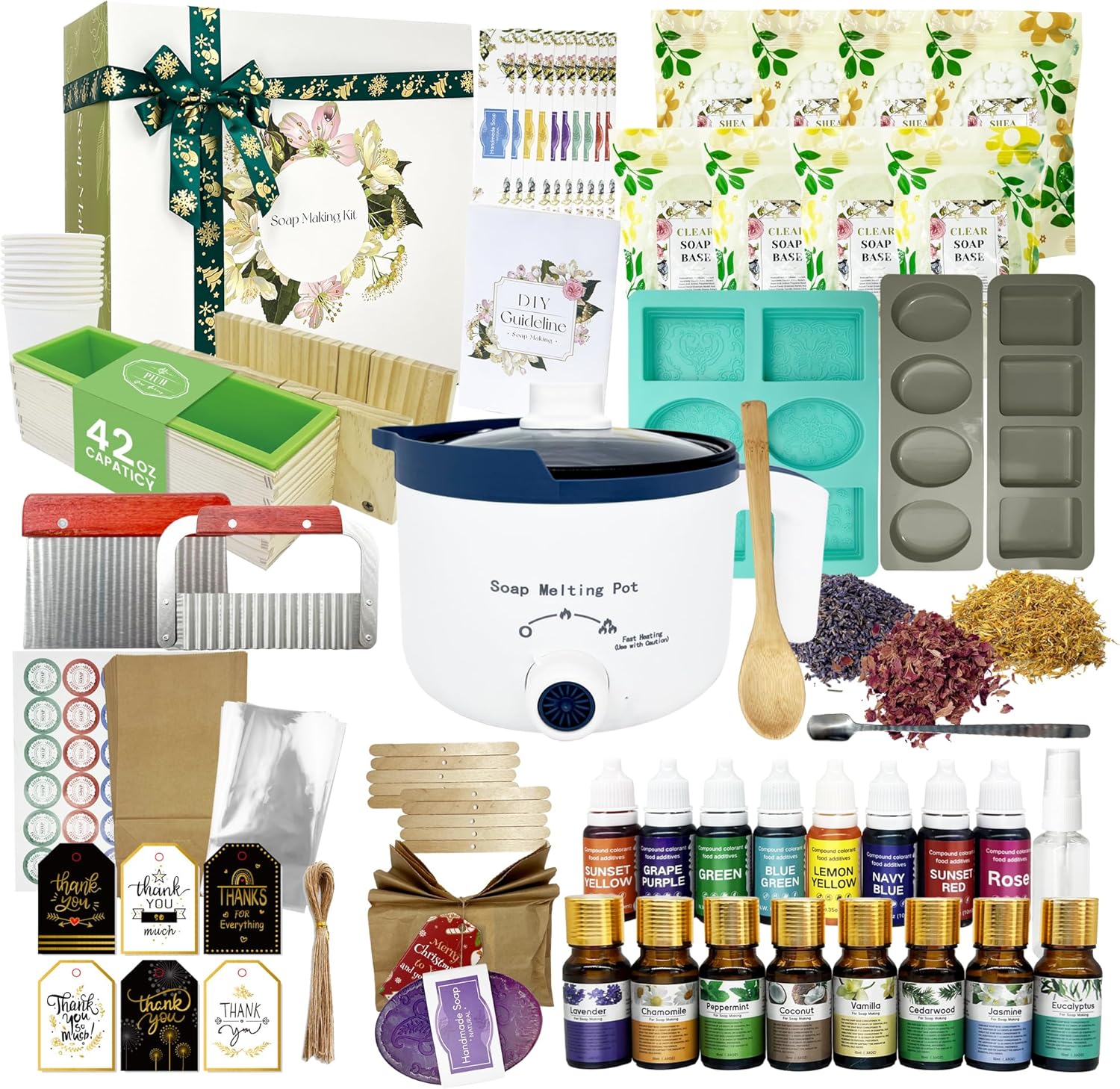
The PIUH Deluxe arrives in what can only be described as "comprehensive." Eight different essential oils, eight dyes, three varieties of dried flowers, and - the centerpiece - an electric soap melting pot that looks like a tiny rice cooker had a craft store awakening. The melter handles 1000g of soap base in about 20 minutes, with a non-stick interior and a pouring spout designed to prevent the inevitable countertop disasters.
Product Box:
- Electric melting pot (7.4 x 5.3 x 6.7 inches, 2.42 lbs)
- 4 lbs soap base (4x shea butter, 4x clear glycerin, 250g blocks)
- 8 essential oils, 8 liquid dyes, 3 dried flower varieties
- 2 silicone molds, 1 loaf mold with cutting box
- Wavy & straight cutters, 5 stirring sticks
- 30 clear bags, 20 paper bags, 10 wrappers, 30 stickers
The kit includes both shea butter and clear glycerin bases (4 pounds total, split into 250g blocks). The molds span both approaches - individual cavities for uniform bars and a loaf setup with cutting box for that slice-of-cake aesthetic. The cutting box, paired with both straight and wavy cutters, handles the measuring and slicing with the precision of someone who's watched too many soap-cutting videos online.
PIUH offers bundle deals adding 10 pounds of additional base in various types, pushing the total investment toward the "serious hobby" category. Customer feedback centers on the melting pot's efficiency and yield - "lots of soap for gifts" - with the math suggesting roughly 16 standard bars from the included 4 pounds.
PIUH Goat Milk Soap Making Kit
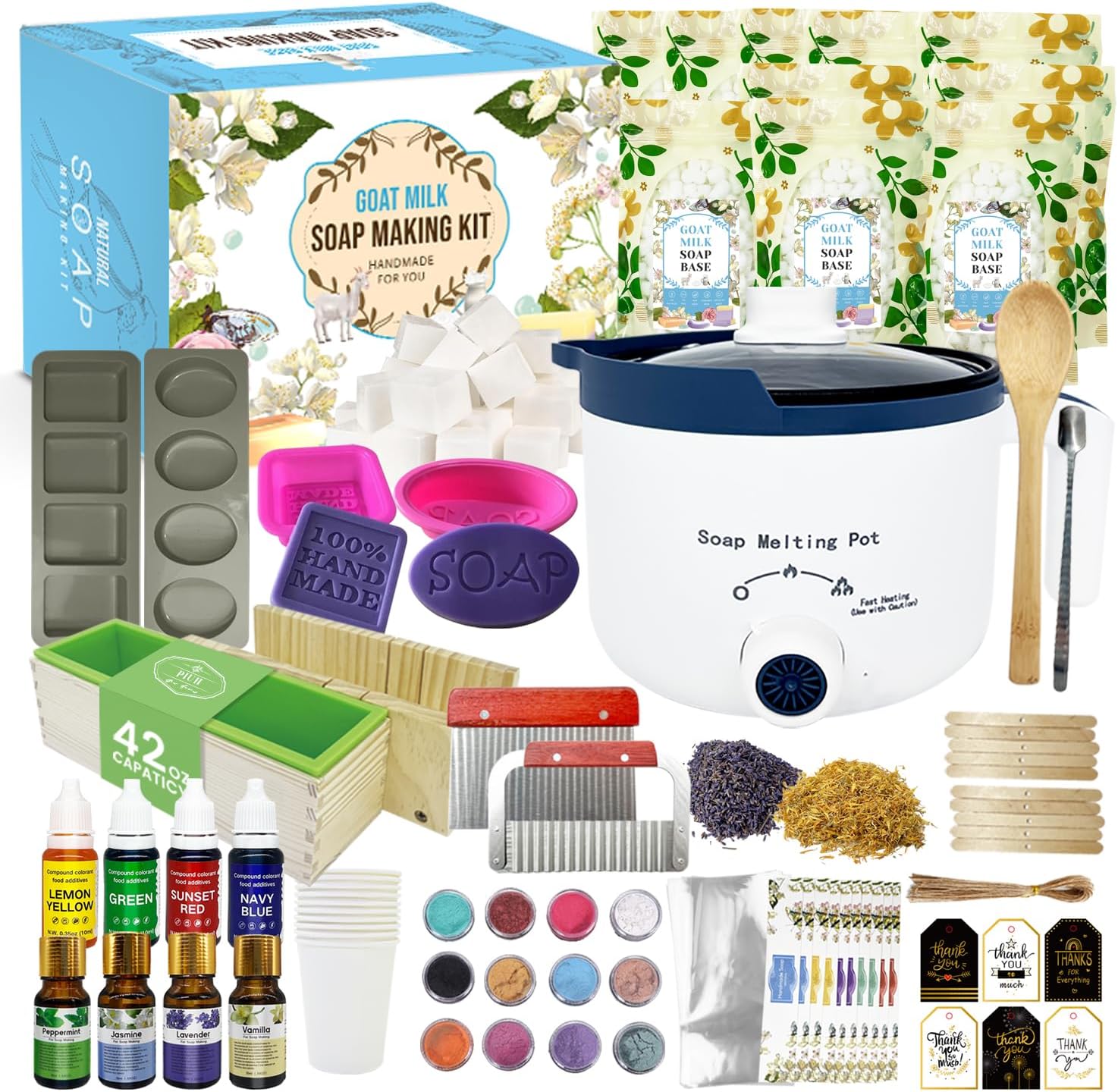
The goat milk version scales back slightly from the Deluxe, focusing on a single base type - 1.25 kg of goat milk soap base split into five 250g blocks. Same electric melter, fewer accessories. The goat milk base brings its own character: naturally creamy, slightly sweet-scented, remarkably forgiving when you inevitably add too much fragrance.
Product Box:
- Electric melting pot (same specs as Deluxe)
- 1.25 kg goat milk soap base (5x 250g blocks)
- 4 essential oils, 4 liquid dyes
- 4 silicone molds, 1 loaf mold with cutting box
- Wavy & straight cutters, 10 stirring sticks
- 30 clear bags, 10 wrappers, 30 stickers
The reduction in variety (no dried flowers, fewer oils and dyes) drops the price by about twenty dollars while maintaining the electric melting capability. For those specifically interested in goat milk soap - which has developed something of a following among people convinced it solved their skin issues - this targeted approach makes more sense than the everything-included Deluxe.
CraftZee Large Deluxe Soap Making Kit
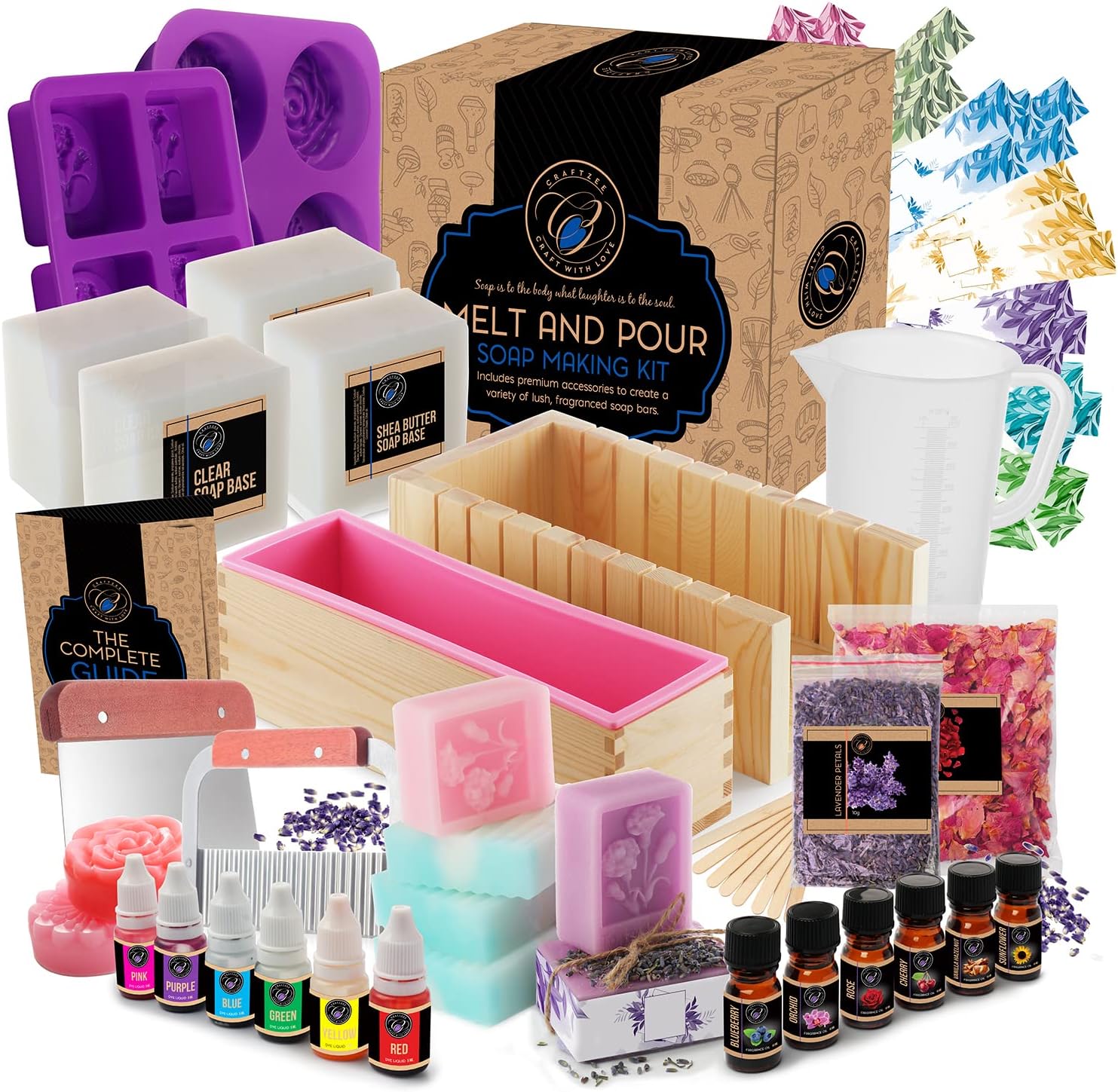
CraftZee takes a different approach - no electric melter, but more variety in molds and finishing supplies. The kit assumes you own a microwave and aren't afraid to use it. Four pounds of base (split between shea butter and clear), six fragrances, six dyes, and actual dried flowers that reportedly maintain some color.
Product Box:
- 4 lbs soap base (2x shea butter, 2x clear)
- 6 fragrance oils, 6 liquid dyes
- Dried rose petals and lavender
- Soap cutter box with wavy & straight cutters
- 1 silicone loaf mold, 2 floral silicone molds
- Microwave-safe pitcher, 8 stirring sticks
- 25 wrappers, instruction manual
The inclusion of a soap cutter box - essentially a measured wooden frame that guides your cuts - suggests CraftZee expects you to lean into the loaf soap aesthetic. The floral molds add variety, though "floral" in this context means "vaguely flower-shaped cavities that produce soaps looking like they escaped from a grandmother's guest bathroom."
Customer reviews mention ease of use and pleasant scents, though opinions split on value - some call it comprehensive, others note you're paying premium prices for what amounts to a pitcher and some measuring tools.
Illumive Soap Making Kit
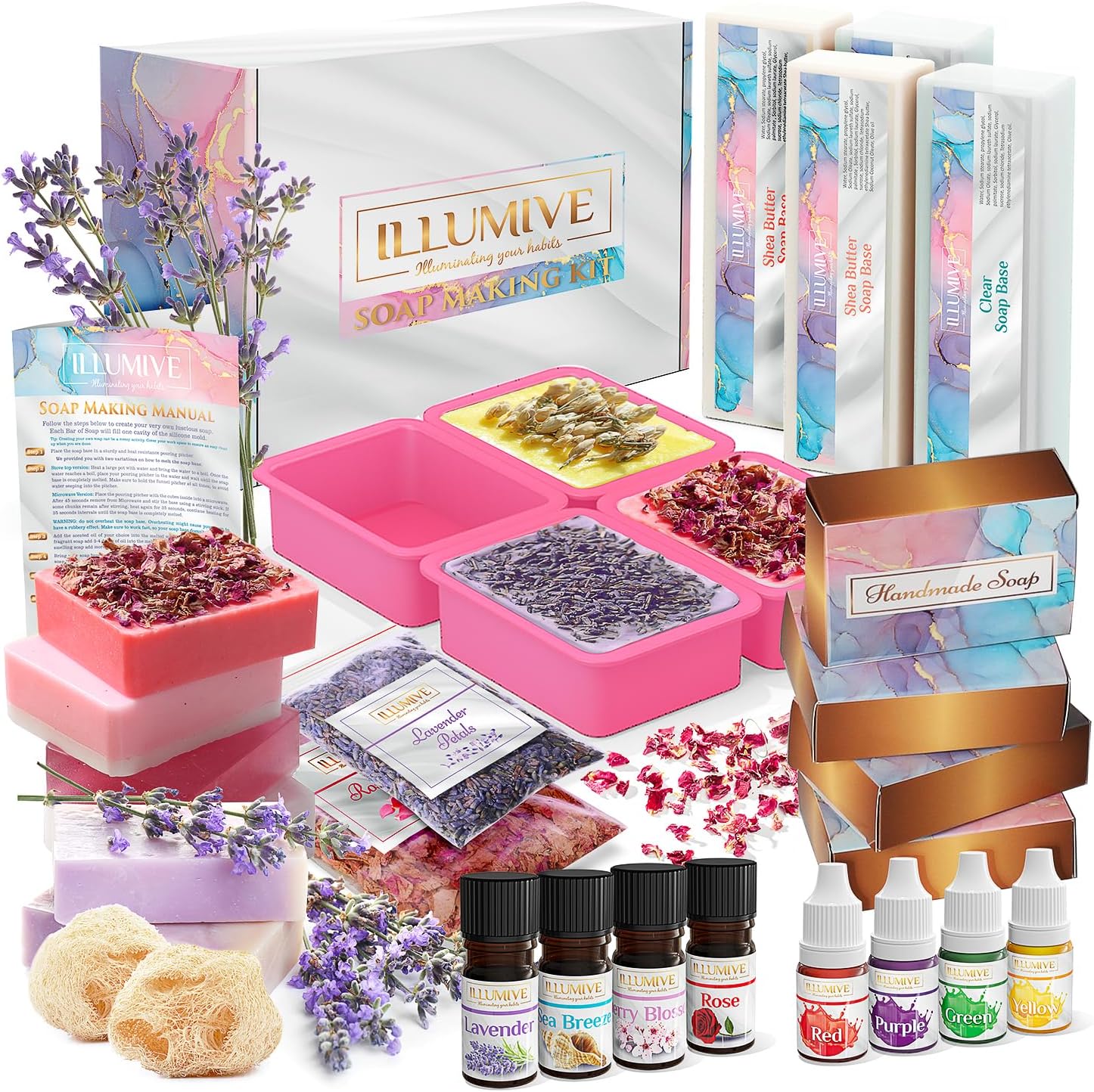
At the budget end, Illumive delivers the essentials without pretense. Both glycerin and shea butter bases, dried flowers, fragrances, dyes, basic molds, and - unexpectedly - loofah sponges you can embed in the soap for an exfoliating effect that ranges from "pleasant" to "aggressive dermabrasion" depending on placement.
Product Box:
- Glycerin and shea butter soap bases
- Multiple fragrances and liquid dyes
- Dried rose petals and lavender
- Soap molds (unspecified material)
- Loofah sponges for embedding
- Soap boxes for gifting
- Basic instructions
The kit's main innovation: those loofah pieces. Embedded in clear glycerin, they create bars that look like soap ate a kitchen sponge - oddly appealing to the "natural exfoliation" crowd. The included gift boxes make sharing your creations easy, whether you're selling at craft fairs or creating personalized presents.
CraftZee Basic Soap Making Kit
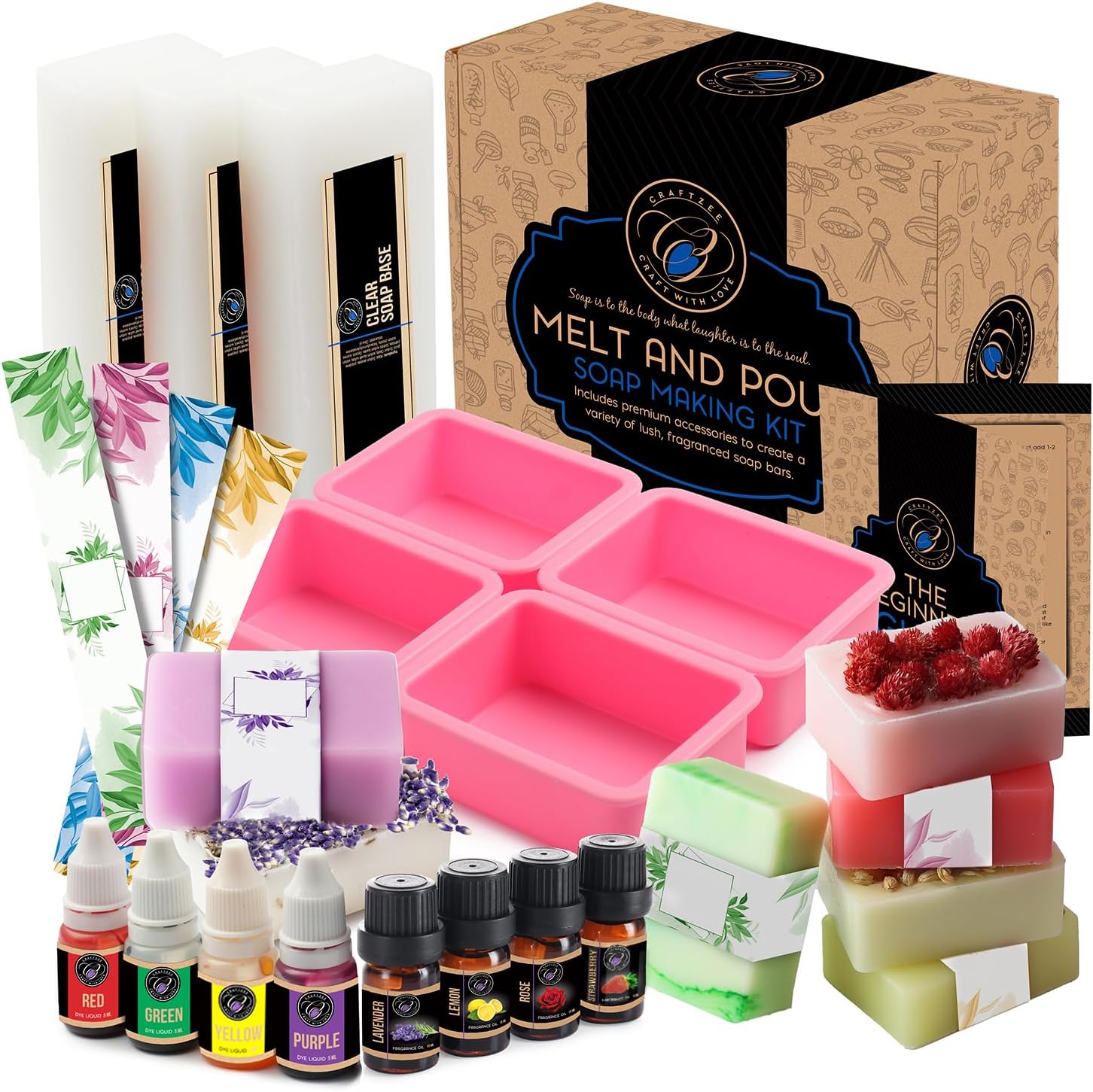
CraftZee's entry-level offering strips things to fundamentals: 1.5 pounds of glycerin base, four fragrances, four dyes, four silicone molds, and basic packaging. No melting equipment, no cutting tools, minimal instructions that assume you know what a microwave is and how to use it.
Product Box:
- 1.5 lbs glycerin soap base (3x 0.5 lb pieces)
- 4 fragrances (strawberry, lemon, lavender, rose)
- 4 liquid dyes (red, green, purple, yellow)
- 4 silicone soap molds
- 4 paper wrappers
- Instruction manual
At around thirty dollars, this kit answers the question "what if I just want to try soap making once?" The 1.5 pounds of base yields roughly 6 bars, enough to determine whether you find the process meditative or tedious. Customer consensus: it works, it's simple, it's exactly what you'd expect for the price.
The Returning Champions
Several kits from previous years remain available, their continued existence suggesting either popularity or impressive warehouse capacity:
ZenseMe Soap Making Kit
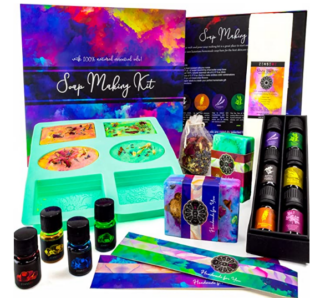
ZenseMe promises "luxury" through 2 pounds of shea butter base, six "therapeutic" essential oils, and silicone molds that actually release soap without requiring negotiation. The marketing language reaches peak wellness - "organic, vegan, great quality" - though soap base is, by definition, processed beyond any meaningful organic designation.
Product Box:
- 2 lbs shea butter soap base
- 6 essential oils, 6 liquid dyes
- Silicone molds
- Basic tools and instructions
- No melting equipment included
Reviews suggest it produces approximately 8 bars, with the silicone molds earning particular praise for their release properties. Additional equipment needed: spray bottle with rubbing alcohol, measuring cup, wooden spoon - the things your kitchen probably already contains.
Custom Melt and Pour Glycerin Kit by Glory Creek
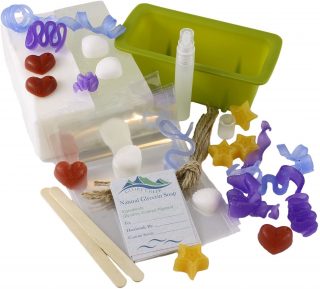
Glory Creek targets the embed enthusiast - 12 small shaped soaps (stars, hearts, seashells) you suspend in clear glycerin for that "soap with prizes inside" effect. The 2 pounds of base (clear and white) and mini loaf pan work perfectly for small-batch production and experimenting with different techniques.
Product Box:
- 2 lbs soap base (clear and white glycerin)
- 12 embed shapes (4 stars, 4 hearts, 4 seashells)
- Decorative squigglies and ribbons
- Silicone mini loaf pan
- 8 gift bags with jute ties
- Gift cards, 2 craft sticks
The embed approach creates soaps that children find fascinating and adults describe as "whimsical," which is code for "has stuff floating in it."
Complete DIY Soap Making Kit by Nicole
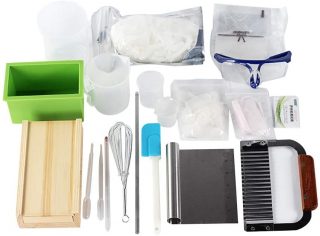
Nicole's kit straddles two worlds - it includes safety equipment for traditional lye soap making (glasses, gloves, pH strips, thermometer) but only 500g of melt-and-pour base. It's like buying a race car helmet for your bicycle commute. The loaf mold setup with wave knife, straight knife, and wooden beveler suggests serious intentions about soap aesthetics.
Product Box:
- 500g soap base (minimal for melt-and-pour)
- Safety equipment for lye process
- Loaf mold with cutting tools
- Wave knife, straight knife, beveler
- 4 measuring cups, 2 pipettes
- Silicone scraper, stainless steel whisk
The kit assumes you'll graduate to cold-process soap making, hence the safety gear. For melt-and-pour purposes, you're essentially buying expensive cutting tools and a small amount of base. Reviews suggest purchasing additional quality base immediately.
The Market Reality
Soap making kits in 2025 fall into three categories: basic microwave sets (around $30), comprehensive packages without heating equipment ($50-80), and "deluxe" versions with electric melters ($90-110). The price jump for an electric melting pot - essentially a tiny slow cooker - runs $30-40, raising questions about whether convenience justifies the cost.
Most kits produce enough soap to determine whether you enjoy the process or find it tedious. The universal experience: your first batch looks nothing like the photos, your second batch improves marginally, and by the third attempt you're either researching bulk soap base suppliers or gifting your supplies to someone else.
The dried flowers included in most kits exist in a quantum state - simultaneously "botanical additions" and "brown plant matter of indeterminate origin." The essential oils range from "surprisingly pleasant" to "aggressive air freshener," with lavender appearing in every kit like some sort of soap-making law.
Every kit includes packaging supplies - bags, boxes, labels - ready for gift-giving or selling at local markets. The abundance of wrapping materials makes sense once you start creating unique bars that people actually ask about.
Ready to put your new supplies to work? Here are a couple of recipes to try: honey oatmeal soap for that rustic, moisturizing bar, or coffee cinnamon honey soap for something that smells like a fancy coffeehouse minus the attitude.